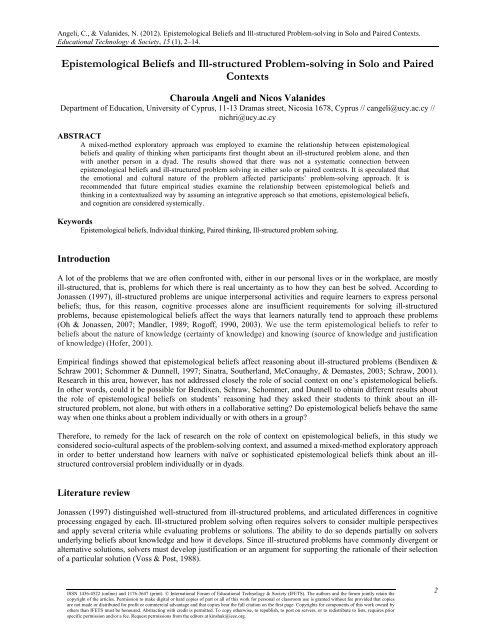January 2012 Volume 15 Number 1 - Educational Technology ...
January 2012 Volume 15 Number 1 - Educational Technology ...
January 2012 Volume 15 Number 1 - Educational Technology ...
You also want an ePaper? Increase the reach of your titles
YUMPU automatically turns print PDFs into web optimized ePapers that Google loves.
Angeli, C., & Valanides, N. (<strong>2012</strong>). Epistemological Beliefs and Ill-structured Problem-solving in Solo and Paired Contexts.<br />
<strong>Educational</strong> <strong>Technology</strong> & Society, <strong>15</strong> (1), 2–14.<br />
Epistemological Beliefs and Ill-structured Problem-solving in Solo and Paired<br />
Contexts<br />
Charoula Angeli and Nicos Valanides<br />
Department of Education, University of Cyprus, 11-13 Dramas street, Nicosia 1678, Cyprus // cangeli@ucy.ac.cy //<br />
nichri@ucy.ac.cy<br />
ABSTRACT<br />
A mixed-method exploratory approach was employed to examine the relationship between epistemological<br />
beliefs and quality of thinking when participants first thought about an ill-structured problem alone, and then<br />
with another person in a dyad. The results showed that there was not a systematic connection between<br />
epistemological beliefs and ill-structured problem solving in either solo or paired contexts. It is speculated that<br />
the emotional and cultural nature of the problem affected participants’ problem-solving approach. It is<br />
recommended that future empirical studies examine the relationship between epistemological beliefs and<br />
thinking in a contextualized way by assuming an integrative approach so that emotions, epistemological beliefs,<br />
and cognition are considered systemically.<br />
Keywords<br />
Epistemological beliefs, Individual thinking, Paired thinking, Ill-structured problem solving.<br />
Introduction<br />
A lot of the problems that we are often confronted with, either in our personal lives or in the workplace, are mostly<br />
ill-structured, that is, problems for which there is real uncertainty as to how they can best be solved. According to<br />
Jonassen (1997), ill-structured problems are unique interpersonal activities and require learners to express personal<br />
beliefs; thus, for this reason, cognitive processes alone are insufficient requirements for solving ill-structured<br />
problems, because epistemological beliefs affect the ways that learners naturally tend to approach these problems<br />
(Oh & Jonassen, 2007; Mandler, 1989; Rogoff, 1990, 2003). We use the term epistemological beliefs to refer to<br />
beliefs about the nature of knowledge (certainty of knowledge) and knowing (source of knowledge and justification<br />
of knowledge) (Hofer, 2001).<br />
Empirical findings showed that epistemological beliefs affect reasoning about ill-structured problems (Bendixen &<br />
Schraw 2001; Schommer & Dunnell, 1997; Sinatra, Southerland, McConaughy, & Demastes, 2003; Schraw, 2001).<br />
Research in this area, however, has not addressed closely the role of social context on one’s epistemological beliefs.<br />
In other words, could it be possible for Bendixen, Schraw, Schommer, and Dunnell to obtain different results about<br />
the role of epistemological beliefs on students’ reasoning had they asked their students to think about an illstructured<br />
problem, not alone, but with others in a collaborative setting? Do epistemological beliefs behave the same<br />
way when one thinks about a problem individually or with others in a group?<br />
Therefore, to remedy for the lack of research on the role of context on epistemological beliefs, in this study we<br />
considered socio-cultural aspects of the problem-solving context, and assumed a mixed-method exploratory approach<br />
in order to better understand how learners with naïve or sophisticated epistemological beliefs think about an illstructured<br />
controversial problem individually or in dyads.<br />
Literature review<br />
Jonassen (1997) distinguished well-structured from ill-structured problems, and articulated differences in cognitive<br />
processing engaged by each. Ill-structured problem solving often requires solvers to consider multiple perspectives<br />
and apply several criteria while evaluating problems or solutions. The ability to do so depends partially on solvers<br />
underlying beliefs about knowledge and how it develops. Since ill-structured problems have commonly divergent or<br />
alternative solutions, solvers must develop justification or an argument for supporting the rationale of their selection<br />
of a particular solution (Voss & Post, 1988).<br />
ISSN 1436-4522 (online) and 1176-3647 (print). © International Forum of <strong>Educational</strong> <strong>Technology</strong> & Society (IFETS). The authors and the forum jointly retain the<br />
copyright of the articles. Permission to make digital or hard copies of part or all of this work for personal or classroom use is granted without fee provided that copies<br />
are not made or distributed for profit or commercial advantage and that copies bear the full citation on the first page. Copyrights for components of this work owned by<br />
others than IFETS must be honoured. Abstracting with credit is permitted. To copy otherwise, to republish, to post on servers, or to redistribute to lists, requires prior<br />
specific permission and/or a fee. Request permissions from the editors at kinshuk@ieee.org.<br />
2

















